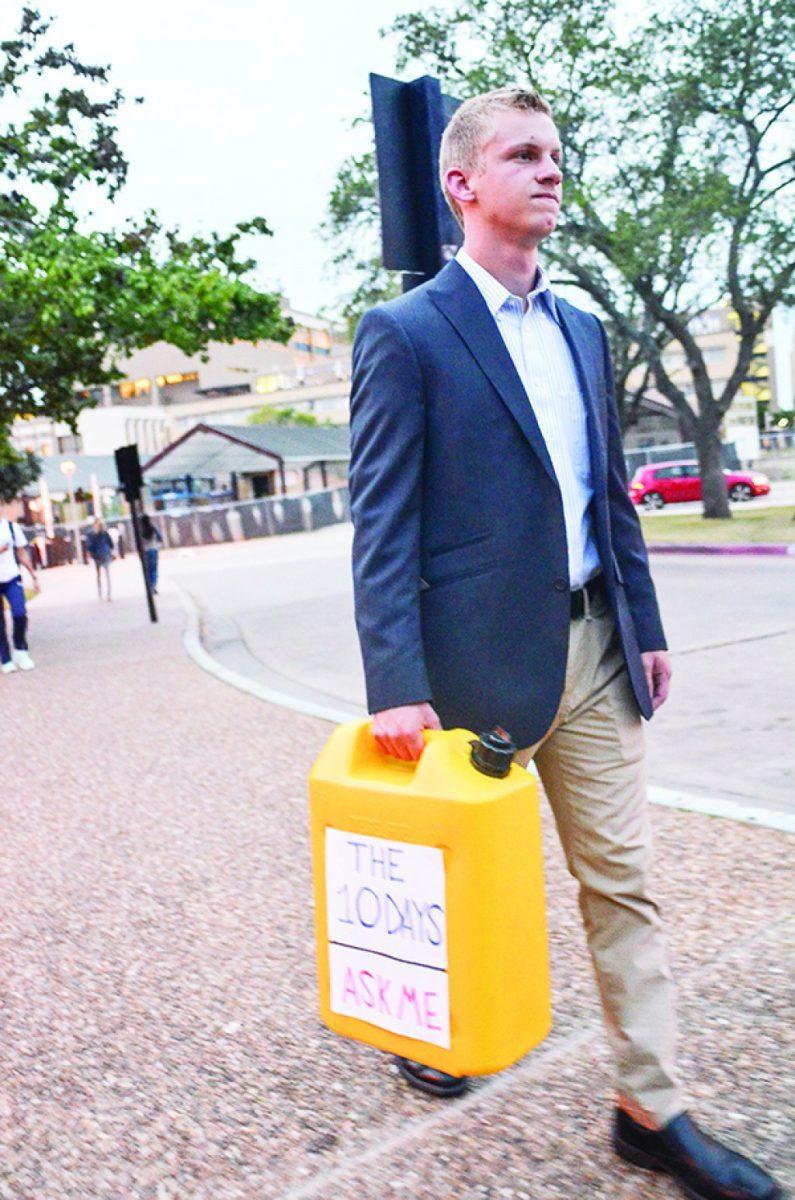Jerry cans are better known for lugging around gasoline, but in some African settlements like Ruhango, Rwanda, people use them to retrieve water after traveling miles on foot.
For the past two weeks, members of The Wells Project, the student chapter of nonprofit Living Water International, have carried large yellow cans across campus, to and from classes, in hopes of sparking conversation about the lack of clean water throughout rural African communities.
Conor Barry, English senior and vice president for The Wells Project, said the idea behind carrying Jerry cans was to ultimately raise awareness about the lengths that millions go just to access water.
“Women and children carry those cans up to seven miles on average and those things weigh about 50 pounds,” Barry said. “They do that every morning just to get water for one day and often times the water they retrieve isn’t even clean. Their efforts to just get water for the day creates time poverty, less time for them focus on building their communities, going to school, etc.”
Barry said the cans are passed off to members of the organization and some choose to carry the cans filled with water to better physically understand the experience.
Sam Richter, accounting junior and member of The Wells Project, said he carried a can around Wehner and the Mays Business School area.
“When these things are filled with water, these five-gallon containers weigh 40 pounds,” Richter said. “I filled one up with water and I could barely carry it 200 feet, let alone five miles.”
Richter said carrying the Jerry cans around campus drew student attention.
“I have been on the bus or walking around the business school with the can and people ask me, ‘Why do you have a Jerry can?’” Richter said. “And that gives me an opportunity to tell them about The 10 Days and how they can help, how they can participate and different things like that.”
Megan Milstead, marketing junior and member of The Wells Project, said she loves carrying the can around campus.
“I got to have so many cool conversations with people who had no idea what the 10 Days was, all because I decided to carry around a huge yellow diesel can, and it was definitely worth it,” Milstead said.
Even carrying a can without water was difficult, said Milstead. She said the experience gave her perspective about how difficult it would be to have to retrieve water every day.
“It is a very different life than the one I grew up with, but still the same needs exist between me and the tons of kids in Rwanda carrying around these cans,” Milstead said. “We both have the need for water and we both have the need for Jesus.”
Barry, who went to Honduras with Living Water International on a mission trip, said its drilling staff said areas must be drilled sometimes 200 to 300 feet in order to find clean water.
“In Rwanda, it’s actually deeper and the soil is harder and rockier so it’s even more difficult to drill into,” Barry said.
The can carrying is, in part, to bring recognition to The 10 Days, a campaign in which students pledge to give up any other beverage except for water and donate the money they would have spent on beverages to support the drilling of water wells in Ruhango.
Richter said he is excited to see how much he actually spends on drinks. He said he anticipates that he’ll save around $20 to $50.
“Your normal cup of coffee or iced tea or soda could go from anywhere from $2 to $4, depending from where you get it,” Richter said. “Each drink you sacrifice is worth $2 or $3 and throughout The 10 Days you keep a tally of how much money you saved by giving up those drinks.”
Barry said he is touched by the power of small sacrifices and the fact that sacrificing one beverage can bring so much life to so many.
Richter believes the past success of The Wells Project also helps evoke excitement among people on campus.
“Last year A&M raised $100,000 and planted five clean-water wells in Africa, and this was done nationwide,” Richter said. “These five wells that we planted now perpetually give clean water to over 2,000 people in different villages.”
Ultimately, The Wells Project and Living Water International’s goal is for others to hear the Christian Gospel, Richter said.
“So, the Living Water International, not only do they plant wells in these countries, but every villager who comes there and drinks from it, they teach them about Jesus,” Richter said.
Milstead said the thing that touches her the most about The 10 Days is that it does not just ask people for money — it asks for sacrifice.
“We ask people to get uncomfortable, to give up coffee and soda and orange juice and whatever for 10 whole days, so that a kid in Rwanda can have water for the rest of his life,” Milstead said. “We can challenge people to look at how their small choices can make a huge impact. The coolest thing about The 10 Days is that we get to sacrifice, just as Jesus came to this earth and sacrificed himself even to the point of death, so we get to live out that love for those who are thirsty.”
The 10 Days begins Sunday.
10 day stand
November 4, 2014
Photo by Jonathan Sheen
International studies freshman Keenan Stallings has pledged to carry Jerry cans to spread awareness about water needs in Africa as part of The Wells Project.
Donate to The Battalion
Your donation will support the student journalists of Texas A&M University - College Station. Your contribution will allow us to purchase equipment and cover our annual website hosting costs.





















